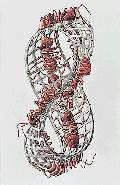For some time now I have been writing about history of technology in libraries - focusing on the phenomenology and chronologies of digital libraries, their public life and private histories. I am interested in the perception of technologies that shape the reproduction of graphic record and the emergence or circulation of texts, records and their memory trails. I will use this blog for commonplacing.
Most intriguing for me recently has been the new Bowker's book on memory practices in the sciences.
Organic Mobius
 The record emerges within the "jussive power" of the archive (Bowker 2005) which means that it creates and is determined by the constraints of the archive. How is the materiality of the record (ontological realities that are tied to its predictable features) related to the emergence and ordering of the archive?
The record emerges within the "jussive power" of the archive (Bowker 2005) which means that it creates and is determined by the constraints of the archive. How is the materiality of the record (ontological realities that are tied to its predictable features) related to the emergence and ordering of the archive?"The ordering or "jussive" principle determines what can be known, what counts as knowledge. Depending on the archive, it could correspond to a set of shared assumptions, a legal apparatus, a theoretical framework or an explicit database schema typed formally into a computer. The inaugural act has both positive and negative aspects. Positively, it is what enables the collection, storage and retrieval of knowledge. It provides collectors with a framework for selecting and harvesting exemplars of the permitted type of knowledge and hammering them into a useful form. Negatively, the inaugural act prevents certain types of entities from being considered as candidates for the status of knowledge and distorts the representation of others by shoehorning them into whatever preexisting schematic category they can be made to inhabit (Bowker Local 7). It also necessarily removes the stored knowledge from its original context which serves as its meaning-providing home."
From: Innovation and Structure in Bowker and Fields, by Lyn Headley (http://dewey.ucsd.edu/writing/bowker-fields.html)